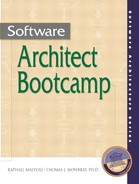9.8. Psychology of Ownership
With individuals and groups, a very important concept is ownership. This is using the "not invented here" syndrome to our advantage in psychological warfare. Ownership can take a long time to develop but is a very important concept for the architect to foster. Ownership can be much more easily eliminated than developed.
Ownership can be quickly eliminated if there is one "know-it-all" person who overrules and makes all decisions on a design or project. For some naysayers, this is the definition of the architect's role. To avoid this perception, the architect cannot be a micromanager. The architect should focus on architecturally significant questions and delegate engineering design questions to the responsible developers. In this way, individual developers acquire and control ownership of their own design space. Interfering with their design decisions, without an overwhelming reason, can be deadly to a project, because it destroys ownership.
Smart people know how to give someone else an idea. This is the key to ownership on the personal level. On most projects there is a "customer," someone who literally owns the project from a financial or responsibility perspective. Many customers are quite insistent that their ideas always take precedence, even if they are not qualified on the technical subject matter. Anyone else's "bright idea" can be either accepted or discarded, based on their whim or fancy. As an architect, you need to be sensitive to this phenomenon. There are some arguments which you can't win, no matter how right you are, because you don't "own" the project. It is not your money being spent, for example.
You must learn to let go of certain cherished ideas, if you can't win over the real project owner. In our work experience, this situation will arise most frequently when there is a direct family relationship between the real project owner and a team member. Many good ideas will get overruled because the family member disagrees—whether or not he or she is really qualified to do so. This is a good example of "life is not fair." And it is something that you will have to live with, unless you leave the project.
Ownership is best fostered in a relationship of trust among the team members and the architect. There must be a division of design responsibilities if there is to be both ownership and quality design. The architect is responsible for architecturally significant decisions. The other team members each have assigned responsibilities. If everyone contributes, and is told how important his or her contributions are, there is the proper environment for establishing a sense of ownership. Ownership requires respect for all team members, no matter how large-scale or narrowly focused their responsibilities are.
In the psychological warfare over ownership, the desired outcome is long-term peace, with mutual respect and trust. A powerful weapon in this battle for peace is showing that you care about team members and their ideas. Some might call it affection or love. People won't listen to you until they know you care about them. Psychologically, what people want most is "to know that they matter," that you think their ideas are important and worth considering, that you think their contributions are essential to the effort. This feeling of mutual respect should be fostered at every opportunity. Showing respect for team members often results in reciprocal feelings for the architect. We use these concepts often in our own daily lives.
Some architects do rule by ego. They do their best to dishonor and discredit other people's ideas through political techniques and/or meeting confrontations. And they can be very successful, professionally. In the wake of such people you will find many discontented persons, crushed by the overwhelming ego. This fosters feelings of resentment which are long-lived, well beyond project completion. We do not like working with people like this, although we have had plenty of experiences with such people. You will have to make your own judgments, if this is your style of interaction. We do know that the person who rules by ego destroys ownership intentionally. And we think that practice is counterproductive.
